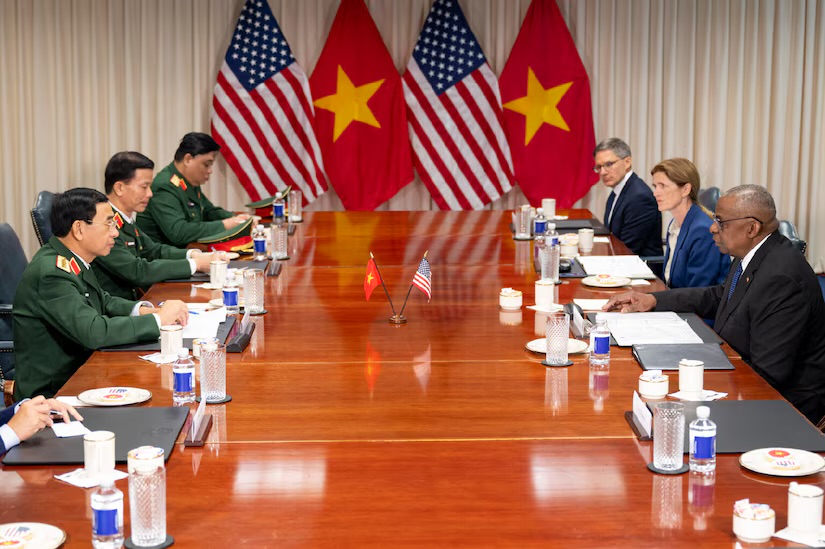Secretary of Defense Lloyd J. Austin III met with Vietnamese Minister of Defense, General Phan Van Giang, at the Pentagon. The meeting reinforced the growing defense ties between the U.S. and Vietnam and addressed war legacies. It marked a year since the two nations elevated their relationship to a Comprehensive Strategic Partnership.
Building Stronger Ties
During their discussion, Austin stressed the U.S.’s commitment to strengthening ties with Vietnam. He highlighted the ongoing efforts to overcome the legacies of the Vietnam War. This includes accounting for those who went missing during the war and assisting Vietnam in its search for its fallen service members.
Austin praised Vietnam for its cooperation in these efforts and noted that both countries are committed to continuing this work through the Vietnam Wartime Accountability Initiative. The U.S. remains focused on overcoming the legacies of the war. Austin emphasised that both nations are working together to heal from the war and move forward as partners.
Condolences for Typhoon Yagi Victims
Austin expressed his condolences to Vietnam for the loss of life caused by Typhoon Yagi. The storm recently hit Vietnam’s northern coast, leading to significant damage. He commended Vietnam for their effective response to the disaster. Austin added, “Please let us know if the United States can assist in any way,” as an offer of American assistance.
Increased Military Cooperation
The meeting also celebrated the growing military cooperation between the two countries. Austin noted the recent port visits of the U.S. Navy’s 7th Fleet flagship, USS Blue Ridge, and the U.S. Coast Guard Cutter Waesche, to Cam Ranh, Vietnam. In addition, Vietnam hosted two important missions: the Pacific Partnership and the Pacific Angel humanitarian response mission. These missions demonstrate the strong collaboration between the U.S. and Vietnam on humanitarian efforts and defence cooperation.
War Legacies and Dioxin Remediation
A key part of U.S.-Vietnam cooperation is addressing the lasting effects of the Vietnam War. Austin reaffirmed the U.S. commitment to helping Vietnam clean up dioxin contamination at Bien Hoa Air Base. Dioxin, a harmful chemical used in Agent Orange during the war, has caused long-term health and environmental damage in Vietnam.
The U.S. Department of Defense has already contributed $150 million to this effort. Austin announced that the U.S. will commit an additional $65 million over the next five years. This will bring the total U.S. contribution to $215 million. Austin stated, “As we advance our common objectives of regional peace and prosperity, it is more crucial than ever that we are collaborating more closely than before.”
New Defense Cooperation Agreement
Both leaders also discussed ways to deepen defense cooperation. They focused on defense trade, industrial base resilience, and information sharing. Austin and Giang highlighted a new agreement to strengthen military medical cooperation. This partnership aims to enhance healthcare for soldiers and strengthen military health systems in both countries.
To further solidify their defense ties, Austin and Giang signed an Updated Joint Vision Statement on U.S.-Vietnam Defense Relations. This document outlines the future roadmap for defense cooperation between the two nations.
A Year of Growth in U.S.-Vietnam Relations
The meeting was held after one year of President Biden’s visit to Vietnam. During that visit, both countries worked to elevate their relationship to a Comprehensive Strategic Partnership. This partnership now covers various areas, including diplomacy, economics, and defense.
A “new phase of bilateral cooperation and friendship” between the United States and Vietnam was heralded by the White House. The increased military cooperation over the past year is a clear sign of the growing trust and collaboration between the two nations.
The meeting between Secretary Austin and General Giang showcased the deepening defense ties between the U.S. and Vietnam. Both countries are committed to addressing the legacies of the Vietnam War, enhancing military cooperation, and promoting regional peace. As they continue to work together, the future of U.S.-Vietnam relations looks stronger than ever.
To read original article visit DOD website.

